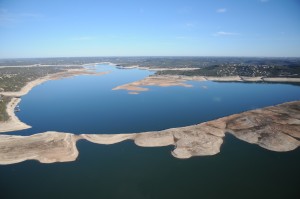New Proposal Could Cut Off Rice Farmers for Third Year in a Row

Photo by LCRA
The extreme drought and 2011 releases to farmers lowered levels in Lakes Buchanan and Travis (pictured) in Central Texas.
After a month of heavy rains and flooding culminating in the wettest October in history for Austin, many in Central Texas are likely wondering if the drought is over. Far from it: Austin’s reservoirs in the Highland Lakes are still very low, roughly only a third full, and could reach their lowest levels in history this winter. A new proposal out today from the Lower Colorado River Authority (LCRA) plans for the drought to possibly continue well into next year.
If the plan goes forward, it would likely cut off most rice farmers downstream for a third year in a row if the Highland Lakes don’t see significant rains this winter, increasing the amount of water in the lakes. Much of the precipitation this past month fell downstream of the lakes and did little to raise the levels of the two main reservoirs in Central Texas, Lakes Buchanan and Travis.
It’s the most restrictive proposal the authority has made since the drought began, designed to give the Highland Lakes time to recover from several years of dry weather and massive releases of water to agricultural customers in the summer of 2011.
The plan would also mandate water restrictions for residential consumers in Central Texas cities like Austin, limiting watering to once a week. (Those restrictions are already in place from Austin Water; but this would be the first time the LCRA mandates water conservation from residential customers.) The emergency drought plan from LCRA staff still needs to be approved by the authority’s board and the Texas Commission on Environmental Quality.
A third year without water for most rice farmers on the Lower Colorado could have a significant impact on the industry there. Farmers have said that crop insurance isn’t likely to cover a third year of losses.
“It’s difficult to recommend a course of action that will likely result in most farmers not receiving water for a third straight year,” LCRA General Manager Becky Motal said in a statement. “We fully understand how painful this drought is for people throughout the basin, but we have to protect the water supply for our municipal and industrial customers. Extending the water supply for those needs has to remain our top priority during this drought.” The LCRA is also asking residential consumers to stop watering their lawns completely from November to February to conserve.
The LCRA has been in a tug of war for several years now over water stored in the Highland Lakes, a conflict pitting rice farmers against lake businesses against Austinites with green lawns. But Laura Huffman, head of the Nature Conservancy in Texas, says the conversation is all wrong.
“One of the things that is so important in Central Texas is making sure that we don’t all just start pointing our fingers at someone else and say, ‘It’s your problem, you fix it,’” Huffman says. It’s that finger-pointing that Huffman says gets in the way of creative solutions.
“If a city becomes interested in reducing the losses in agriculture, for example, that becomes water supply available for the cities,” Huffman says. “And, look, the bottom line is still going to be the same for everyone: less water is going to have to be the solution.”
That is exactly what the LCRA is proposing for next year if the lakes don’t see significant rain over the winter. The agency’s board will take up the proposal at a meeting on November 19th, with public comment open until noon on November 18th.
The LCRA is also building a reservoir downstream of the Highland Lakes that will store water for agricultural consumers like rice farmers while reducing demands on the lakes. The project is expected to be completed by 2017, with a cost of over $200 million. It’s one of several projects in the state that could potentially apply for funding from the state if Proposition 6 is approved by voters Tuesday.

